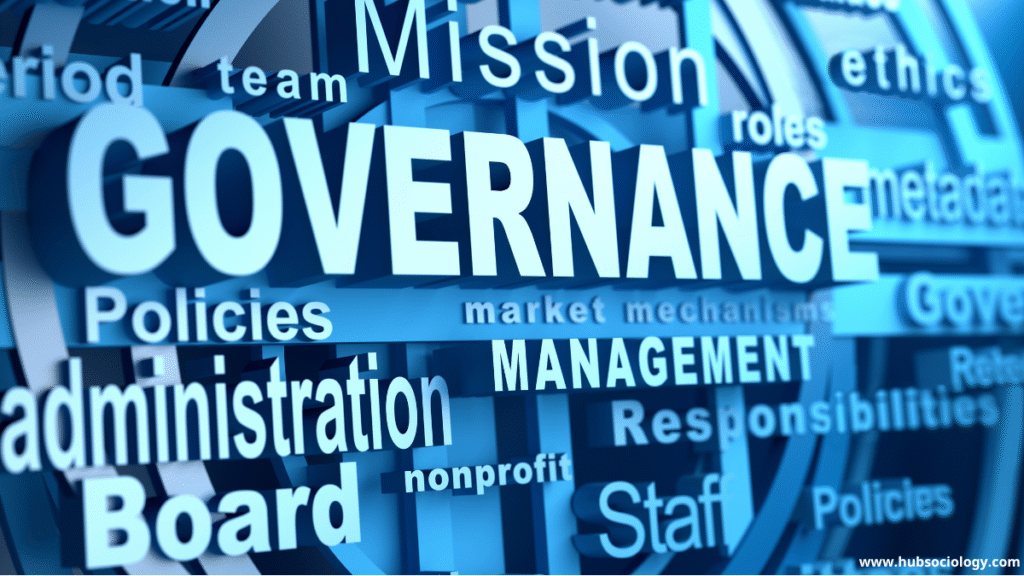Introduction on Governmentality and Risk
In contemporary sociology, the concepts of governmentality and risk have become central to understanding how modern societies are organized, regulated, and disciplined. The term governmentality was developed by Michel Foucault in the late 1970s to describe the rationalities, techniques, and practices through which populations are governed. It shifts attention from traditional notions of government as an institution to broader forms of power that shape everyday life.
Risk, on the other hand, has been theorized by sociologists such as Ulrich Beck and Anthony Giddens as a defining characteristic of late modernity, where individuals and institutions increasingly orient their actions around anticipating and managing uncertain futures. Bringing these two concepts together allows us to analyze how modern governance functions through the management of risk—whether health risks, environmental hazards, economic insecurities, or security threats.

This article explores the sociological aspect of “governmentality and risk,” tracing their conceptual origins, examining how they intersect, and highlighting their relevance in understanding contemporary social order.
Governmentality: Beyond the State
Foucault’s concept of governmentality represents a profound rethinking of power. Traditional sociological theories often treated government as the central authority or as a set of political institutions. Foucault, however, argued that governance extends far beyond the state and is embedded in social practices, institutions, and discourses.
Governmentality refers to:
- Rationalities of rule – ways of thinking about governing populations, such as liberalism, neoliberalism, or welfare rationalities.
- Techniques and instruments – statistical data, surveillance mechanisms, health campaigns, economic policies, and legal frameworks.
- Subject formation – the shaping of individuals as responsible, self-regulating subjects who internalize norms and act in alignment with governance.
In this framework, governing is not simply about coercion or laws but about producing knowledge, norms, and practices that guide individuals’ conduct. Schools, hospitals, prisons, and even self-help programs are all part of this diffuse network of governmentality.
Risk: The Sociology of Uncertainty
Parallel to Foucault’s work, sociologists such as Ulrich Beck (Risk Society, 1986) and Anthony Giddens (The Consequences of Modernity, 1990) developed theories of risk that emphasized how modern societies are increasingly preoccupied with the future and potential harm.
In Beck’s theory of the risk society, industrial modernity generates “manufactured risks”—hazards that are human-made rather than natural. Examples include nuclear disasters, climate change, financial crises, and biotechnology uncertainties. These risks are global in scope, difficult to predict, and often irreversible.
For Giddens, risk management is central to modern institutions, from insurance systems to security regimes. Risk is not just a technical problem but a cultural and political one: how societies imagine risks, who is held responsible, and how institutions respond all reflect deeper social structures.
Thus, risk becomes a key way of organizing social life in modernity, shaping policies, governance, and even individual behavior.
The Intersection of Governmentality and Risk
The convergence of governmentality and risk occurs in the recognition that governing modern populations often happens through risk management. Rather than governing by force alone, authorities govern by framing individuals and groups as at risk and by encouraging them to take responsibility for mitigating these risks.
Examples include:
- Public health: Governments regulate behaviors by encouraging citizens to eat healthily, exercise, or vaccinate. Risk factors like smoking, obesity, or unsafe sex are framed as individual responsibilities but also as collective concerns.
- Security and surveillance: Terrorism or cybercrime risks are managed through surveillance technologies, airport checks, and risk profiling. Individuals are expected to remain vigilant, report suspicious behavior, and accept restrictions for safety.
- Environmental governance: Climate change policies use the discourse of risk to justify carbon taxes, renewable energy transitions, and behavioral nudges toward sustainability.
- Economic governance: Financial risks such as debt or unemployment are increasingly individualized, with citizens encouraged to save, invest, and insure themselves, while structural inequalities remain obscured.
In these cases, risk serves as a tool of governmentality—it legitimizes interventions, mobilizes populations, and produces self-regulating citizens.
Risk as a Mode of Discipline
From a Foucauldian perspective, risk functions as a disciplinary mechanism. When individuals are told they are at risk—of disease, poverty, crime, or unemployment—they are encouraged to adopt specific behaviors and internalize norms.
For example, health risk campaigns not only inform but discipline: the smoker is constructed as a deviant subject whose actions threaten both themselves and society. Similarly, unemployed individuals may be framed as risky subjects whose lack of work discipline threatens economic stability, leading to policies of welfare conditionality.

Risk discourses also produce categories of populations: “high-risk groups,” “vulnerable communities,” or “dangerous classes.” These categories justify differential treatment, often reinforcing existing inequalities. Thus, governmentality and risk are not neutral but deeply political, shaping who is governed, how, and to what ends.
Critiques and Challenges
While the concept of governmentality and risk has enriched sociological analysis, it has also faced critiques:
- Overemphasis on discourse: Critics argue that Foucauldian approaches sometimes underplay material inequalities and economic structures in favor of discursive power.
- Responsibilization: The focus on individual responsibility in risk management may obscure structural factors such as poverty, racism, or global capitalism. For example, telling people to “eat healthily” ignores food deserts and economic constraints.
- Global inequalities: Risk governance is uneven across the globe. Developing countries face greater exposure to environmental and health risks but have less capacity to manage them, revealing power asymmetries in global governance.
- Resistance and agency: People do not simply accept risk discourses; they resist, reinterpret, and negotiate them. Social movements around climate change, health rights, or digital privacy highlight how risk can also be mobilized against dominant powers.
Contemporary Relevance
Understanding governmentality and risk is crucial for analyzing current global challenges:
- COVID-19 pandemic: The pandemic exemplified how governments mobilized risk discourses to enforce lockdowns, promote vaccines, and regulate behavior. Citizens were simultaneously governed by state policies and expected to self-regulate through masks, distancing, and hygiene.
- Climate crisis: Climate governance depends heavily on risk communication, scientific modeling, and behavioral interventions. Citizens are asked to change consumption patterns while states balance growth with sustainability.
- Digital society: Risks of surveillance, data breaches, and misinformation highlight new forms of governmentality, where both states and corporations manage populations through digital technologies.
- Economic precarity: With neoliberal policies, economic risks like unemployment, pension insecurity, and healthcare costs are increasingly individualized, producing new forms of anxiety and discipline.
In each case, risk functions as both a rationality of governance and a lived social experience, shaping how individuals relate to institutions and to themselves.
Conclusion on Governmentality and Risk
The sociological exploration of governmentality and risk reveals the intricate ways in which modern governance operates. Governmentality emphasizes that power is not limited to state institutions but dispersed across social practices, rationalities, and discourses. Risk highlights the centrality of uncertainty, anticipation, and future-oriented thinking in organizing modern societies.

When combined, these concepts show how contemporary governance increasingly works through risk management—by framing individuals as responsible subjects, justifying interventions, and producing categories of populations. However, this also raises critical questions about inequality, responsibilization, and resistance.
In an era marked by pandemics, climate change, digital surveillance, and global insecurities, the intersection of governmentality and risk provides a powerful framework for understanding the politics of modern life. It invites sociologists to critically examine not only how risks are governed but also whose risks are prioritized, whose voices are silenced, and how alternative forms of collective responsibility might emerge.
Do you like this this Article ? You Can follow as on :-
Facebook – https://www.facebook.com/hubsociology
Whatsapp Channel – https://whatsapp.com/channel/0029Vb6D8vGKWEKpJpu5QP0O
Gmail – hubsociology@gmail.com
Topic-related questions
5 Marks Questions
- Define the term governmentality as introduced by Michel Foucault.
- What is meant by “risk society” according to Ulrich Beck?
- Explain how risk functions as a disciplinary mechanism in society.
- Give two examples of how public health policies use risk to govern populations.
- State one critique of the governmentality approach to risk.
10 Marks Questions
- Discuss the role of risk in shaping individual responsibility in modern societies.
- Explain the relationship between governmentality and risk with reference to security and surveillance.
- How does Anthony Giddens conceptualize risk in late modernity?
- Analyze how environmental governance demonstrates the intersection of governmentality and risk.
- Discuss with examples how COVID-19 highlighted the role of governmentality in managing risk.
15 Marks Questions
- Critically examine the intersection of governmentality and risk in contemporary sociology.
- Discuss how risk discourses produce categories of populations and reinforce social inequalities.
- Evaluate the strengths and limitations of Foucault’s governmentality approach in understanding risk governance.
- Analyze the impact of neoliberalism on risk management and the responsibilization of individuals.
- “Governmentality and risk are central to understanding global challenges such as climate change, digital surveillance, and pandemics.” Discuss with suitable examples.
